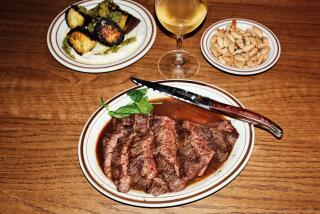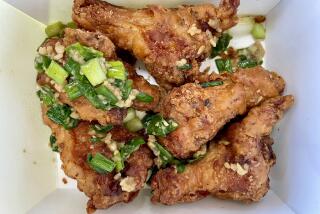We took ‘The Farewell’ director Lulu Wang on an SGV food crawl
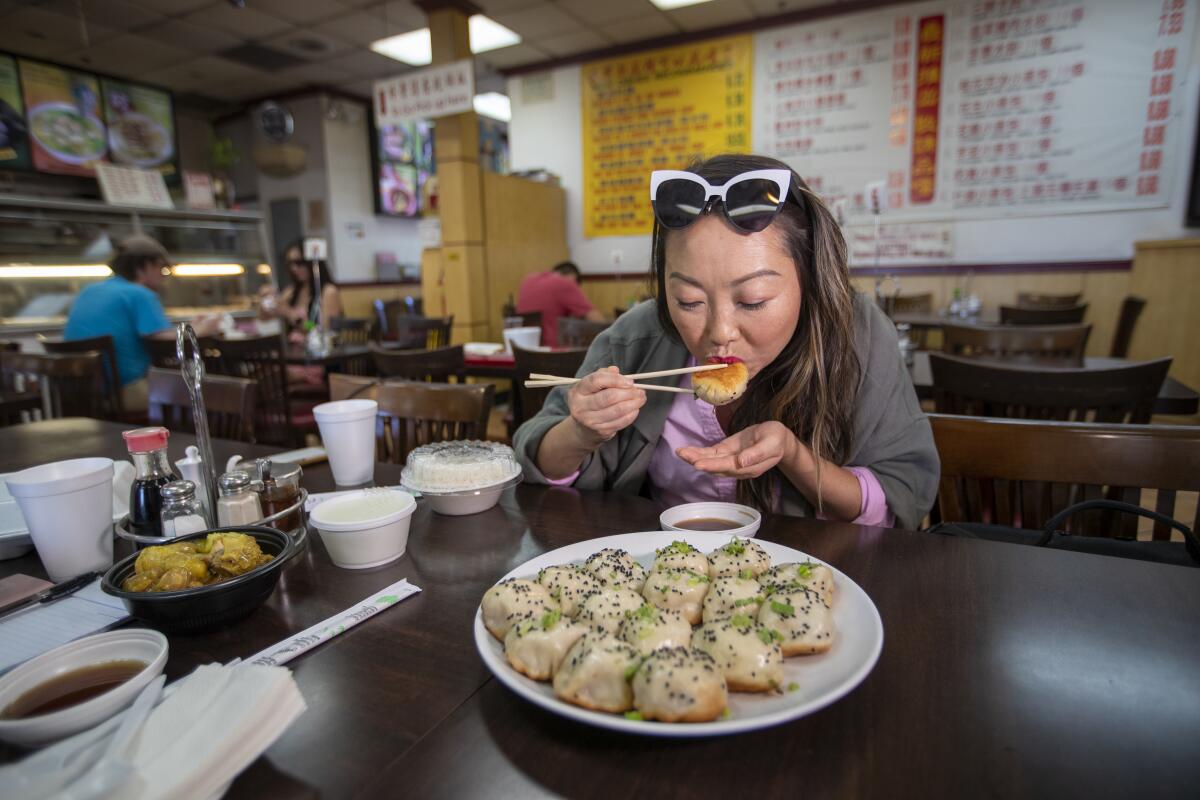
In director Lulu Wang’s movie “The Farewell,” a lie eats away at a Chinese family: Instead of telling a beloved matriarch that she has cancer and only weeks to live, her family plans a fake wedding as a way for everyone to say their goodbyes.
Released in July, “The Farewell” has quickly become one of the summer’s must-see films — making viewers laugh, cry ... and become incredibly hungry.
And that’s the point. Food plays a central role in “The Farewell,” a movie that anyone can relate to when it comes to family dynamics around the dinner table. There is an entire scene that takes place around a lazy Susan, a lavish wedding banquet spread and poignant moments in the kitchen cooking together.
We recently took Wang to eat some of the dishes from the film, including meat pies, roast duck and dumplings. We visited three restaurants in the San Gabriel Valley: Beijing Pie House, Duck House and Kang Kang Food Court. And yes, we stopped for boba in between. You can follow along on our mini food crawl below.
This interview has been edited for length and clarity.
BEIJING PIE HOUSE
Order: Pork and leek meat pie, lamb meat pie, pork and green onion meat pie, egg and leek meat pie, home-style pork and green onion meat pie, tripe, cabbage.

Lulu Wang’s film ‘The Farewell’ features Chinese food in abundance. Director Lulu Wang took L.A. Times Senior Food Writer Jenn Harris on a short food crawl through the San Gabriel Valley to eat some of the dishes featured in the film.
Tell me about the role food plays in the movie.
I wanted food to be part of the texture of the film, but I didn’t want it to be romanticized. I feel like that’s a very Western gaze, to sort of romanticize and exoticize the food. For Chinese people, we’re not like, “I’m a foodie, let’s get obsessed about it and call myself this name because you like food.” Of course you like food. Everybody likes food. I intentionally didn’t want to put a lot of food closeups in the movie just for the sake of beauty.
Why was it important to have certain scenes take place around the table or in the kitchen?
Because it’s reality. That’s where the whole family comes together. And it’s just like growing up, where, especially the women, that’s the action around which the drama or conversation occurs. The entire day revolves around meals. Whether it’s picking up groceries or prepping and everybody doing different parts almost like an assembly line. Some people are washing, cutting — there’s a real system to it. And it just feels authentic to the texture of life.
Why were certain dishes like meat pies and roast duck featured in the film?
The meat pie was the only thing that was specific because it’s my favorite. It’s a very homey thing. I also liked the idea of Grandma shoving a meat pie in her mouth.
You said food in the movie is a “visual representation of the lie” — what do you mean?
The way that Grandma expresses her love is to make all this food and feed you. The way you would normally express that love back is to eat all the food. But if you’re grieving, you lose your appetite. In addition to swallowing their grief, they also have to swallow the food. They are literally swallowing the grief.
The grandma in the film is based on your grandma. Does yours make meat pies too?
She makes the best meat pies. Usually it’s pork and green onion. When I grew up we always ate the round ones, which is almost like an empanada. But now it’s gotten really popular to do a layered meat pie, which is dough, meat, dough, meat. It’s a better skin-dough ratio.
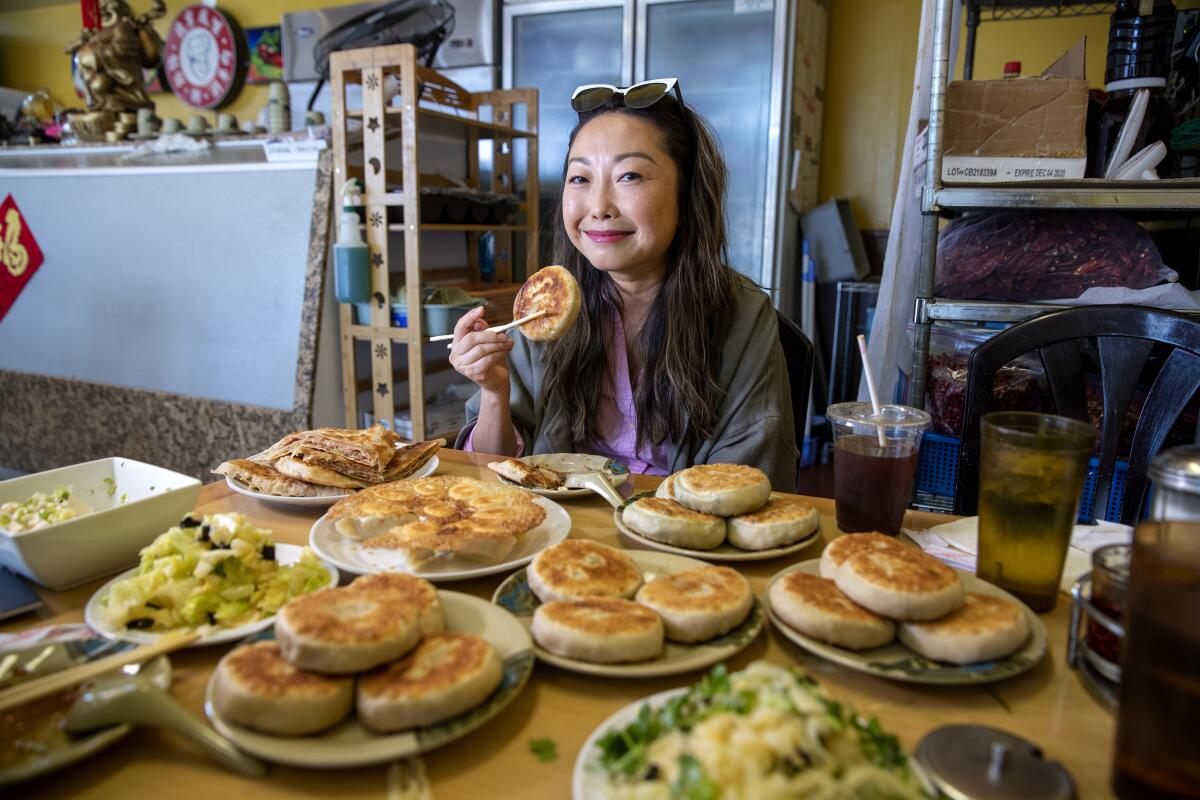
Do you make them?
I never learned how to make the meat pies. My brother [Anthony Wang, who is the sous chef at the new Auburn restaurant on Melrose Avenue] has tried but it’s hard. Especially the dough.
DUCK HOUSE
Order: Cold summer noodles, roast duck
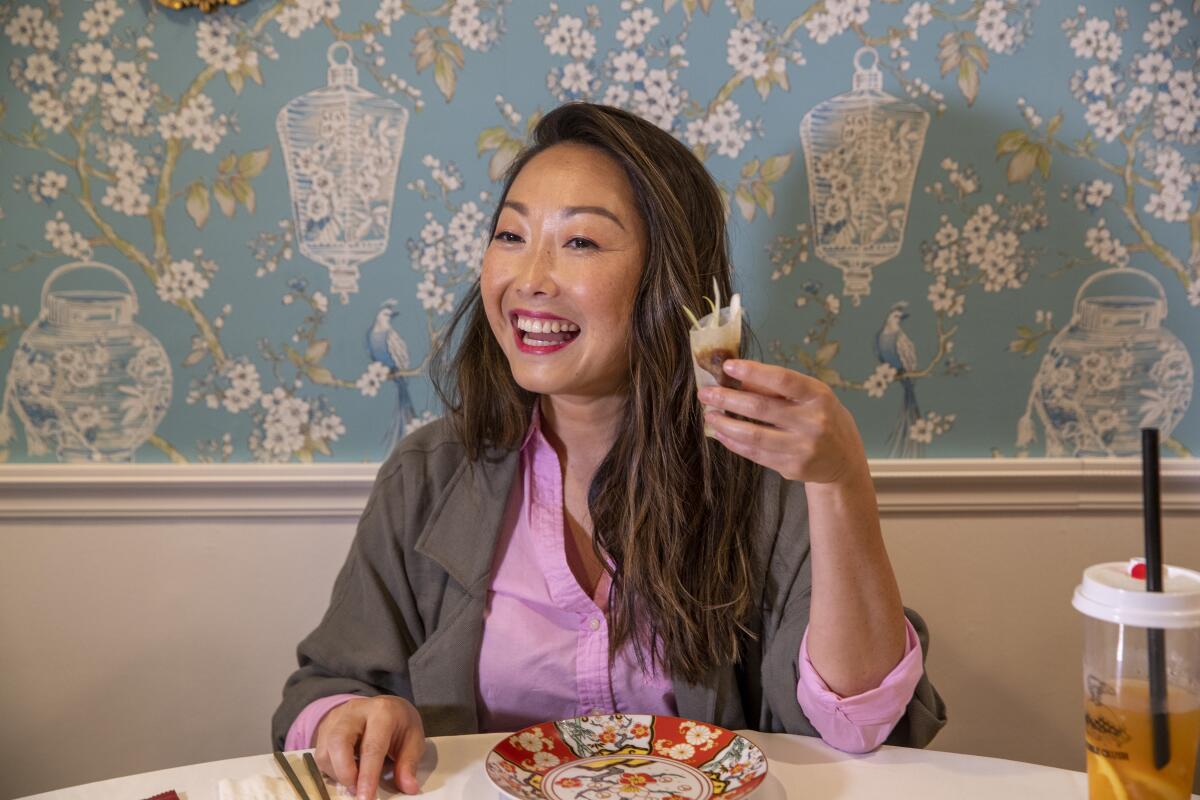
Was there constant eating on set?
You [technically] can’t eat the food you’re filming. But we did. When they were making the meat pies I ate so many, and then everybody was trying them, so they had to keep making them. A person who worked in the art department made the food.
Did you have family members commenting on the food on set?
My great aunt is in the movie playing herself. She was always around when we would do a scene and I would ask her. Also the actors [were] all more familiar with the culture than I am. Everyone was weighing in.
We love that you included roast duck in the movie.
I grew up in Beijing and Beijing roast duck is my favorite. My mom makes it every year for Christmas Eve. How crispy the skin is is how good a duck restaurant is. Now in Beijing, all the fancy restaurants separate the skin and you dip the skin in sugar. It’s probably the worst thing for you but it’s delicious.
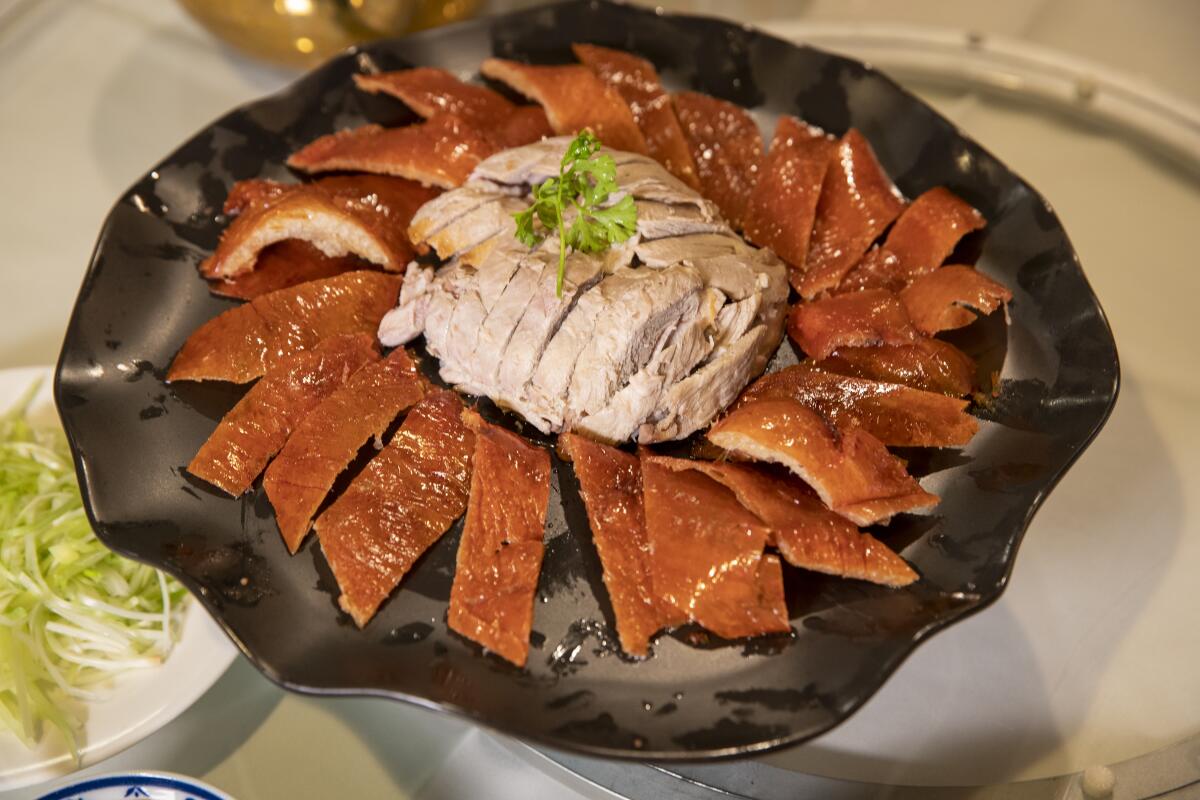
What did your parents think when your brother said he was going into the food industry?
They hated it. The first few years were hard, and my mom blamed me. I’m working on a TV series called “Family Meal” and it’s based on his life, a 19-year-old Chinese American college dropout.
Food is such a central part of Chinese culture, but when someone says they are going to work in that industry, why is it looked upon as not good enough?
The old-world mentality is that cooks are low-income, manual-labor jobs. They are blue-collar. In America especially, if you’re Chinese and you work at a restaurant, there’s a certain connotation among the Chinese immigrant community: It’s the first generation that opens restaurants as a way to survive. You open to support your family so your kids can become doctors and lawyers. The last thing they would think is for my parents to have a son born in America whose life-long dream is to open a restaurant. It’s backwards for them.
But it wasn’t always this way.
If you think about feudal China during times of the emperors, food was a very elevated art form and you had to be really skilled. But the relationship of Chinese Americans and immigrants to food is very different. My brother is working to change the perception of Chinese food in America. How come Italian food can be elevated? Japanese food can be elevated? How do we shift the perception? Why is it OK for people to pay $25 if you call it risotto? But if you call it porridge suddenly everybody is protesting that this is a commoner’s food.
KANG KANG FOOD COURT
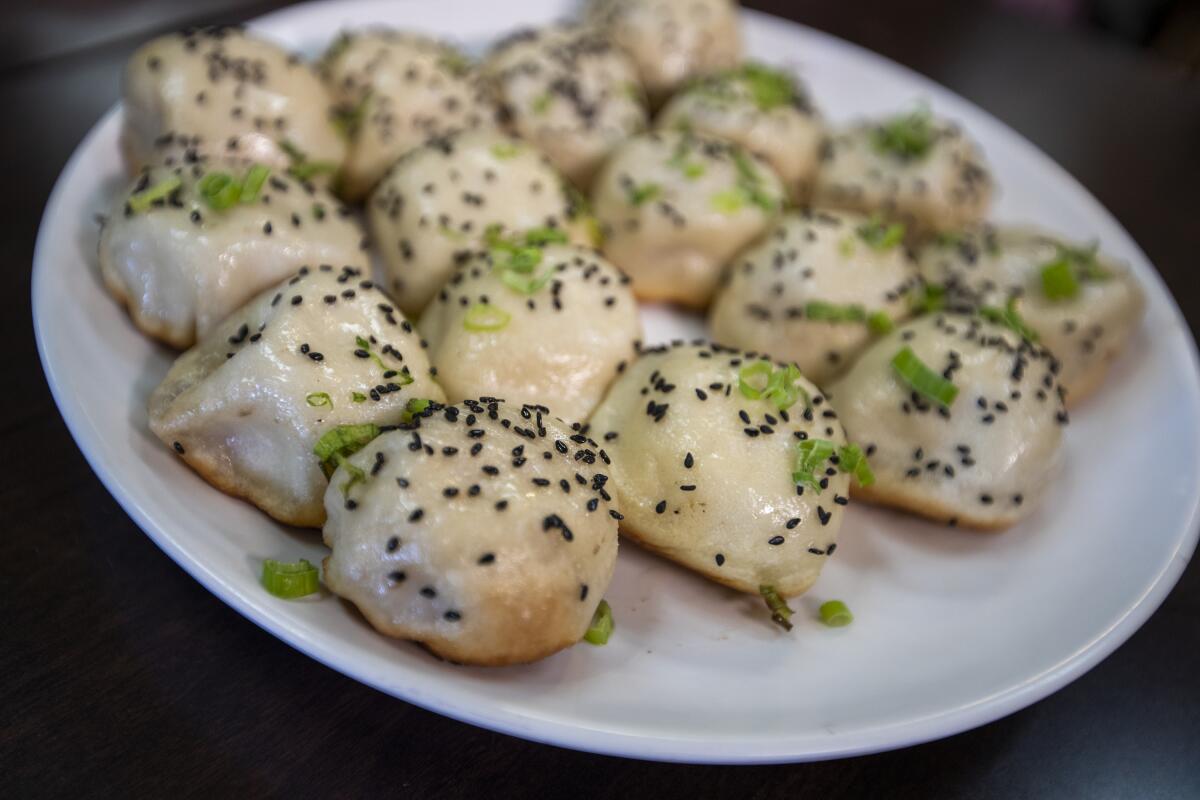
Order: Chinese curry, lions’ head meatballs, sheng jian bao, xiao long bao
Everyone talks about soup dumplings, but I like sheng jian bao. They are underrated. We can hype up sheng jian bao over xiao long bao. Sheng jian bao is more mainland. It’s crispy and pan-fried on the bottom. They are soup dumplings too, but it’s fermented dough. I’m really picky, though. I hate sheng jian bao that doesn’t have enough meat in it.
More to Read
Eat your way across L.A.
Get our weekly Tasting Notes newsletter for reviews, news and more.
You may occasionally receive promotional content from the Los Angeles Times.

